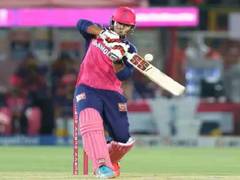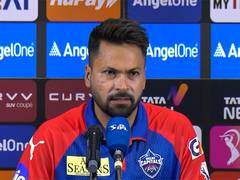Koneru Humpy opens up on balancing professional, personal life; condition of chess in India
New Delhi [India], September 14 (ANI): Indian professional chess player Koneru Humpy opened up about juggling between professional and personal life, the current status of chess in the nation, and how avoiding social media helps her in not getting deviated.
The Indian Grand Master has faced ups and downs throughout her career, while tasting success. The set of challenges that she faced in her professional and personal career became a bit intricate after she became a mother.
While addressing the challenges of managing her professional career and motherhood, Koneru has been selective about the tournaments that she participates in.
“It is a bit difficult to manage both. I was lucky enough to stay in the same town where my parents live. I was able to manage that whenever I travel outside, I leave my kid with them. I am a bit clear on whether it is very important or it has some pros. I am not interested in playing tournaments just for exposure. I have played in a lot of tournaments,” Koneru told ANI.
During Koneru’s career, her father, Koneru Ashok, served as her coach. He helped his daughter hone her skills, which was an advantage for Koneru but also carried a lot of challenges.
“Definitely, as a player, having a father (as coach) is an advantage because you are not restricted with the timing. Psychologically, he used to correct me. The other way around, we never had a father-daughter relationship when we were training. He used to be very strict, and he used to scold me. After the session, I would still not come out of that. I would feel bad about it. But slowly, growing up, I got used to it. I understood it is important to be tough with the kids and to take them in the right direction,” she added.
Koneru has carried the legacy and passed on the basics of chess to her daughter, Ahana, as well. But she feels it is unlikely that her seven-year-old daughter will play chess in the future.
“No, not likely. It all depends on how the kid is interested. So far, I haven’t seen any interest in her. She has learnt the basics of the game, but she was never serious about it. She loves art and spends hours drawing pictures,” Koneru noted.
In a world where athletes regularly use social media to engage with fans and build their popularity, Koneru avoids it in order to avoid things that could deviate her focus.
“I never took social media so seriously, and I don’t even like sharing my personal things in public as well. I am not that kind of person. For me, managing time for chess is difficult, and I don’t want to get deviated with other things,” she remarked.
For the past couple of years, chess has gradually gained more limelight as D Gukesh, R Praggnanandhaa, and many more continue to shine in major tournaments.
However, Koneru feels that chess is still a bit underrated in comparison to other sports, especially cricket.
“Yes, I think so. In the last few years, because of social media, the results have been acknowledged, but before that, when many players won the tournament, nobody bothered about it. Till now, compared with other sports like badminton and cricket, the publicity that players get and the endorsements are quite less,” she said.
Koneru will be in action for the Mumba Masters in the second season of the Global Chess League, which will be played in a unique joint-team format in October. Koneru is expecting a strong tournament and wants to deliver her best.
“It is going to be a strong tournament. As a team, we have a very good chance because each and every team has their own speciality. I just want to give my best. They have created a good fan base. It motivates the players to show their strength, so in that way, it will be very exciting,” she concluded.
In the tournament, the players will compete in a unique joint team format consisting of six players, including two top women chess players and a prodigy player per team.
Each team will play a total of 10 matches in a double round-robin format, with the winner of each match being decided in a best-of-six board scoring system.






